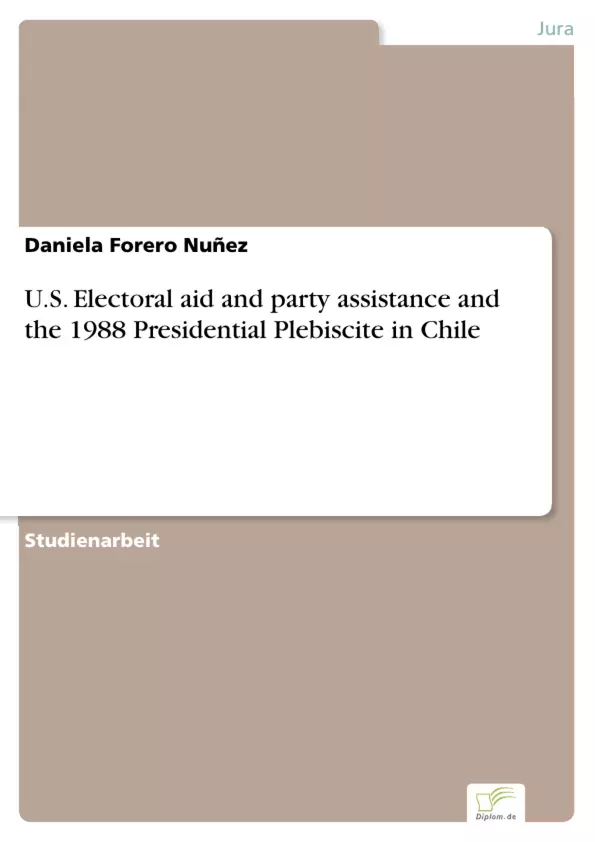Veröffentlichen auch Sie Ihre Arbeiten - es ist ganz einfach!
Mehr Infos
U.S. Electoral aid and party assistance and the 1988 Presidential Plebiscite in Chile
Studienarbeit, 2022, 12 Seiten
Jura - Zivilrecht / Handelsrecht, Gesellschaftsrecht, Kartellrecht, Wirtschaftsrecht
Autor

Kategorie
Studienarbeit
Institution / Hochschule
Note
1,7
With the national referendum on October 25th of 2020, in which nearly 80% of the electorate agreed on the drafting of a new constitution that aimed to put an end to the lasting legacies of Pinochet’s dictatorship, Chileans set a historical milestone that would make room for new political reform and thus broaden democracy in the country. Being ranked as the second most free country in Latin America, Chile has proven to have successfully reconsolidated democratic tradition after a nearly 20-year dictatorial regime under General Augusto Pinochet between 1973 and 1990. In view of recent political events in the country, it results of vital importance to go back to the late 1980s. In this vein, the 1988 presidential plebiscite does not only represent a pivotal event for the 20th century but stands for a turning point in Chilean modern history, since it put an end to 17 years of dictatorial rule and set a breakthrough democracy.
It is worth highlighting that despite such development, the transition to democracy did not occur without difficulties. Legacies dating back from Pinochet’s era indeed continue to shape political debate until the present day. This, however, raises interesting and politically relevant questions around the long-term impact of democracy promotion, more specifically of electoral aid and party assistance. The following paper aims thus to assess the impact of U.S electoral aid and party assistance in the outcome of the aforementioned plebiscite. Chile, unlike other cases of U.S democracy promotion in the continent, is conspicuous for its relatively peaceful democratization, which is why it has become one of the exemplary cases of assisting democracy by these means.
Details
- Titel
- U.S. Electoral aid and party assistance and the 1988 Presidential Plebiscite in Chile
- Autor
- Erscheinungsjahr
- 2022
- Seiten
- 12
- Katalognummer
- V1256848
- ISBN (PDF)
- 9783961164578
- Sprache
- Deutsch
- Schlagworte
- Electoral aid party assistance Chile USA democracy
- Produktsicherheit
- Diplom.de
- Arbeit zitieren
- , 2022, U.S. Electoral aid and party assistance and the 1988 Presidential Plebiscite in Chile, Hamburg, Bedey Media GmbH, https://www.diplom.de/document/1256848

Deutschlands größter Sharing Community
Jetzt Zusammenfassungen, Skripte und Klausuren kostenlos downloaden!
Uniturm.de
Ihre Vorteile als Autor
Geld verdienen Für jedes verkaufte Exemplar erhalten Sie Autorenhonorar - bis zu 40%.Kostenlose Buchveröffentlichung
Als eBook-Studie im Original und / oder auf Wunsch zusätzlich als hochwertiges Fachbuch in unserem renommierten Buchverlag.
Renommee als Fachbuchautor
Präsentieren Sie sich als Fachfrau oder Fachmann in Ihrem Fachgebiet und machen Sie sich bekannt.
Persönliche Betreuung
Unser Lektorat wird Sie persönlich betreuen und ist auch telefonisch unter +49(0)176-85996762 erreichbar.
Weltweit im Buchhandel
Ihr Buch ist weltweit im Buchhandel und Online-Buchhandel wie z.B. amazon erhältlich.
Jetzt Autor werden!
- Copyright
- © Bedey & Thoms
Media GmbH - seit 1997
- Alle Inhalte urheberrechtlich geschützt. Kopieren und verbreiten untersagt.
-
Diplom.de steht seit 1996 für die professionelle und
hochwertige Veröffentlichung akademischer
Abschlussarbeiten im Original als eBook und Buch.
-
Bachelorarbeiten, Masterarbeiten, Diplomarbeiten,
Magisterarbeiten, Dissertationen und andere
Abschlussarbeiten aus allen Fachbereichen
und Hochschulen können Sie bei uns als eBook
sofort per Download beziehen oder sich als Buch
zusenden lassen.




